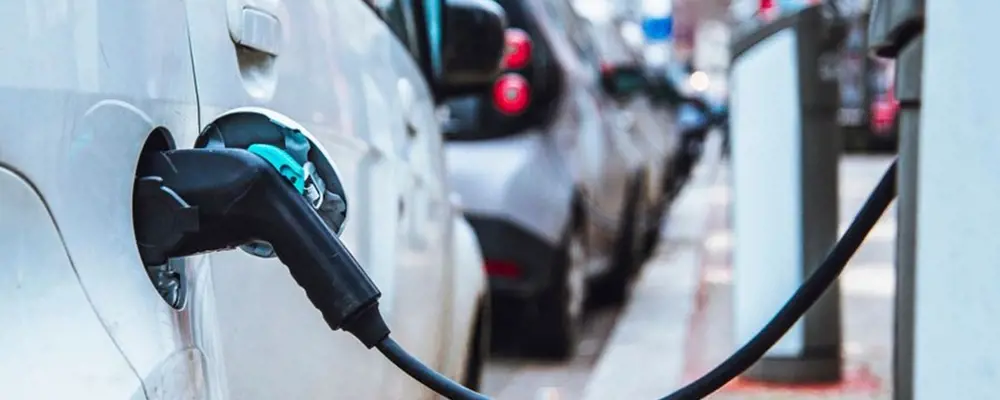Close
Back
Used electric demand remains robust, but interest in new EVs waning - time to put "Road to 2030" back on track with tax breaks

LONDON, 20th April: Despite an exceptionally strong start to 2023, with growth recorded in overall car buying demand, new and used car sales, and average prices, the electric vehicle (EVs) share of the retail market is falling behind where it needs to be to meet the Government’s 2030 targets. According to Auto Trader’s Road to 2030 Report, the Government must step in with a detailed programme of tax incentives to improve the affordability of EVs and support the industry’s efforts in driving mass consumer adoption.
The largest automotive marketplace’s latest insight into the electric vehicle market warns that whilst consumer demand for used EVs is robust, buyer interest in new has dropped by almost two thirds – or 65% - since the beginning of 2022[i] due in part to the rising cost of living, higher borrowing costs, and the well documented hike in energy prices. The market for new EVs is still hampered by a lack of affordable choices, with the number of new electric models between £20,000 - £30,000 – the most popular price bracket on Auto Trader – decreasing, less than seven years before the Government’s ban on new petrol and diesel sales comes into force.[ii]
On average, a new EV costs circa 37% more than a petrol or diesel alternative – a figure that hasn’t changed since June 2022. Among more affordable options below £30,000, the lack of choice is even more acute, with nine times fewer EVs available than traditionally fuelled models.[iii]
Auto Trader’s Report shows that the lower fuel prices and higher energy bills is eroding the previous EV advantage of lower running costs. While electric car owners with a home charger can save up to £130 for every 1,000 miles by charging at off peak overnight rates, savings reduce to just £40 for those drivers using slow/fast chargers. For drivers using ultra rapid chargers, EVs currently cost £16.
Robust used EV demand fuelled by growing choice and softening prices.
Highlighting the nuance of the electric retail market, Auto Trader’s data shows that consumer appetite for used EVs is in a far more robust position, with current (as of mid-April[vii]) levels of demand up 30% year-on-year (YoY).
This positive trajectory is being fuelled, in part, by the recent surge in the number of used electric vehicles entering the market, providing consumers with greater choice than ever before. On Auto Trader, the current volume of second-hand EVs is up 258% on the same period last year.
This growth in supply is set to continue and marks the next phase of the maturing electric market. However, with the levels of supply growing at a faster rate than demand, used EVs are experiencing an expected, but significant price adjustment. Since reaching a peak of £40,728 in July 2022, the average price of a second-hand electric car has fallen to £31,767 in mid-April. This month alone (up to 17th April), prices have dropped -17% on a YoY and like-for-like basis. In contrast, the average price of second-hand petrol and diesel cars are up 5.4% YoY (£16,312) and 3.4% (£16,518) respectively, whilst the broader market is up 3% YoY (£17,888) at the mid-April mark.
Although the average one year old used EV is 28% more expensive than a 1-year-old petrol or diesel alternative,[viii] these price reductions are leading to a greater mix of affordable used EVs, with sub £30,000 stock now accounting for circa 60% of the total. Nearly one in four (24%) are now under £20,000, up from just 7% in August 2022.
With more consumer choice than ever before, the imbalance of supply over demand is slowing the speed in which used EVs are selling. In March, a used petrol and diesel car took a respective average of 25 and 27 days to leave forecourts, whilst EVs took 45. Last summer used electric vehicles were selling five days faster than petrol cars. [ix]
However, Auto Trader’s data reveals that there’s plenty of electric models and derivatives that are performing well ahead of the market average. For example, the Kia EV6 (up to 12 months) took an average of just 16 days to sell, whilst Tesla’s Model 3 (3-5-years old) took just 14. What’s more, there’s also significant regional variations in levels of supply and demand affecting days to sell and potential profit opportunities. A 22 plate MG ZS is currently selling 18 days faster to sell in Glasgow (33 days)[x] than the national average (51), and 26 days faster than in Peterborough (59).
We have the broadest single view of EVs, and as our data highlights, the market is incredibly nuanced, and so a broad-brush rarely reflects the true picture. With the EV market still maturing, its critical to follow the live retail data to identify profitable electric stock opportunities – to ensure you’re buying the right car for your market at the right price, selling them at the right price, and securing the best possible margin in the process.

“These are difficult times for the UK’s electric ambitions, however, and we’re in danger of veering off-track. Although used electric demand remains buoyant, the wider EV market is in a precarious position. To avoid more than just a small pothole on the road to 2030, more information, more incentives, and more equality is urgently required.”
With the introduction of Vehicle Excise Duty on EVs looming in 2025 – further reducing the incentives for ownership - Auto Trader is calling for a series of tax breaks to give a fresh spur to the mass adoption of electric vehicles - something that has worked well in other European countries to stimulate demand and grow the market.
To make the transition to electric fairer, Auto Trader is calling for:
About Auto Trader
Auto Trader Group plc is the UK's largest automotive marketplace. Auto Trader listed on the London Stock Exchange in March 2015 and is now a member of the FTSE 100 Index.
The marketplace is where UK consumers buy and sell cars with the largest number of car buyers and the largest choice of trusted stock. Auto Trader exists to Drive Change Together. Responsibly and creating a diverse and inclusive culture is at the heart of the business. It is focused on changing how the UK shops for cars by providing the best online car buying experience and enabling all retailers to sell online. It aims to build stronger partnerships with its customers and use its voice and influence to drive more environmentally friendly vehicle choices.
Auto Trader publishes a monthly used car Retail Price Index which is based on daily pricing analysis of circa 900,000 vehicles, this data is used by the Bank of England to feed the broader UK economic indicators.
For more information, please visit https://plc.autotrader.co.uk/who-we-are/about-us/
Introduction references
[i] Comparing volume of electric new car leads between January 2022 and March 2023.
[ii] As of 17th April 2023 year-on-year.
Body text references
[i] Calculated using percentage share of new car market, comparing January 2022 and March 2023.
[ii] Comparing number of new models between £20,000 and £30,000 between 1st April 2022 (11) and 1st April 2023 (8).
[iii] Calculated using the number of new car models available to buy from all manufacturers in the UK with a RRP under £30,000. Information sources from Manufacturers. March 2023.
[iv] Analysis of 21 EVs and 21 ICE vehicles. Based on figures from ZapMap’s Price Index September 2022 vs December 2022. Calculated March 2023.
[vii] As of 17th April 2023
[viii] Comparison of median retail price of 1 year old ICE v EV model comparisons. March 2023.
[ix] Based on Auto Trader internal data, battery electric vehicles took, on average, 48 days to sell in March 2023, compared to 27 days for petrol cars. In August 2022, on average, used electric cars sold in 25 days, in the same month, petrol cars took on average 30 days to sell.
[x] Average days to sell of 33 days in Glasgow vs 51 day national average
Follow us on our social channels to keep up with the latest news, insights and company developments.
If you would like to be added to our News & views mailing list, or have any media-related enquiries, please contact our press team:

Sign up to our email alerts service:
Join our news & views mailing list
or submit media-related enquiries: